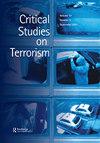Limitations and inconsistencies of using the four waves of modern terrorism to understand Latin America
IF 2.5
Q2 POLITICAL SCIENCE
引用次数: 0
Abstract
ABSTRACTRapoport’s theory of waves of terrorism has been considered a milestone when studying terrorist movements worldwide. This theory states that terrorism develops due to temporal, ideological and technological trends, which stimulate or diminish expressions of terrorism. More concretely, Rapoport argues that since the 19th century, global events have generated four waves of terrorism: anarchist, anticolonial, New Left, and religious. Using the Latin American experience of terrorist movements, this article explores inconsistencies and two main limitations in Rapoport’s theory. Firstly, it shows how Latin America’s historical and political particularities led to the weakness or absence of the anarchist and religious waves. Secondly, this article evidences that Rapoport ignored state terrorism and narcoterrorism, both extremely relevant to understanding terrorism in the region. Consequently, this study concludes that, despite it constituting a powerful theory for understanding terrorism from a global perspective, it requires a more nuanced regional approach and attention to more exhaustive expressions of the terrorist phenomenon.KEYWORDS: Waves of terrorismLatin Americastate terrorismnarcoterrorism Disclosure statementNo potential conflict of interest was reported by the author(s).Notes1. In fact, according to Longmire and Longmire paramilitary groups financed 70% of their operational costs with drug-trafficking earnings (2008, 47).Additional informationNotes on contributorsTamir Bar-OnTamir Bar-On is Assistant Professor in Defense and Security at Rabdan Academy (United Arab Emirates). Bar-On received his Ph.D. in political science from McGill University. He was formerly a Professor-Researcher at the Tec de Monterrey and member of Mexico’s National System of Researchers. Bar-On has also taught at Wilfrid Laurier University, the Royal Military College of Canada, and Yale University. He is the author of seven books, mostly specialising on the radical right, terrorism, and extremism. His latest book with Jeffrey M. Bale is Fighting the Last War: Confusion, Partisanship and Alarmism in the Literature on the Radical Right (Rowman and Littlefield, 2022).Miguel Paradela-LópezMiguel Paradela-López is Assistant Professor in the Department of International Relations of the Faculty of Humanities and Social Sciences at Comillas Pontificial University (Spain) and an assistant Professor in the School and Social Sciences and Governance at Tecnológico de Monterrey (Mexico). He has a PhD in Political Theory from the University of Salamanca (Spain). He has published in journals like Latin American Research Review, Cambridge Review of International Affairs and Latin American Perspectives. His areas of interest include international conflicts, insurrectionist groups and Just-war theory.用现代恐怖主义的四次浪潮来理解拉丁美洲的局限性和不一致性
波特的恐怖主义浪潮理论被认为是研究全球恐怖主义运动的一个里程碑。该理论指出,恐怖主义的发展是由于时间、意识形态和技术趋势,这些趋势刺激或减少了恐怖主义的表达。更具体地说,拉波波特认为,自19世纪以来,全球事件产生了四波恐怖主义浪潮:无政府主义、反殖民主义、新左派和宗教恐怖主义。本文利用拉丁美洲恐怖主义运动的经验,探讨了拉波波特理论中的矛盾之处和两个主要局限性。首先,它展示了拉丁美洲的历史和政治特殊性是如何导致无政府主义和宗教浪潮的软弱或缺失的。其次,本文证明了拉波波特忽略了国家恐怖主义和毒品恐怖主义,这两者都与了解该地区的恐怖主义非常相关。因此,本研究得出的结论是,尽管它构成了从全球角度理解恐怖主义的强大理论,但它需要更细致入微的区域方法,并关注恐怖主义现象的更详尽的表达。关键词:恐怖主义浪潮;拉丁美洲国家恐怖主义;毒品恐怖主义披露声明作者未发现潜在的利益冲突。事实上,根据Longmire和Longmire的研究,准军事组织70%的运营成本都是由贩毒收入提供的(2008,47)。作者简介:tamir Bar-On是Rabdan学院(阿拉伯联合酋长国)国防与安全助理教授。巴昂在麦吉尔大学获得政治学博士学位。他曾任蒙特雷理工大学教授研究员和墨西哥国家研究人员系统成员。巴昂还曾在威尔弗里德劳里埃大学、加拿大皇家军事学院和耶鲁大学任教。他著有七本书,主要是关于激进右翼、恐怖主义和极端主义的。他与杰弗里·m·贝尔合著的最新著作是《打最后一场战争:激进右翼文学中的混乱、党派偏见和危言耸听》(罗曼和利特菲尔德出版社,2022年出版)。Miguel Paradela-LópezMiguel Paradela-López是Comillas Pontificial大学(西班牙)人文与社会科学学院国际关系系助理教授,也是Tecnológico de Monterrey(墨西哥)学院和社会科学与治理系助理教授。他拥有萨拉曼卡大学(西班牙)政治理论博士学位。曾在《拉丁美洲研究评论》、《剑桥国际事务评论》、《拉丁美洲展望》等期刊发表文章。他的研究领域包括国际冲突、叛乱组织和正义战争理论。
本文章由计算机程序翻译,如有差异,请以英文原文为准。
求助全文
约1分钟内获得全文
求助全文

 求助内容:
求助内容: 应助结果提醒方式:
应助结果提醒方式:


